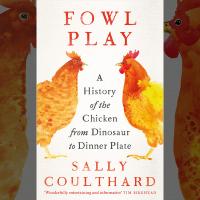Sally Coulthard has a wonderful talent. She takes everyday items – plants, food, buildings, animals – and through the course of a book demonstrates just how wonderful, how interesting they can be. It is ‘the history of things’ taken to the next level, where microhistories are unpacked and extended to reveal not just the story of the object in question but the history of us and our world.
In Fowl Play it is the turn of the humble chicken. Most people probably don't spare this rather odd bird much thought. Its products (including itself) can end up on our dinner plates but, aside from the odd pub-quiz question ('Which living animal is closest to the T. Rex?'), that's the limit of our contact. In fact, every effort can be made not to spend too long dwelling on the life, actions, background of this staple food. In Fowl Play, however, Coulthard takes the reader on the millennia-long journey of the chicken, from its impressive origins, through jungle fowl, show bird, fighter, and scientific guinea pig, to the over-farmed provider of nourishment. At each step, she shows the impact humanity has had on it and - surprisingly - the impact it has had on us. It is both a remarkable and a fascinating story.
I always look forward to reading Coulthard's work. Not only is she exceptionally well-read, but she communicates extremely well. Fowl Play is no exception. In it, Coulthard incorporates history, archaeology, palaeontology, linguistics, mythology, geography, ornithology, genetics, medicine, and the cutting-edge of science into a pacy and engaging narrative, explaining heavy concepts as if they were child's play and delighting in every story. Her sources, from Pliny the Elder to the latest pieces in Scientific American, are wide-ranging and well used. Her turn of phrase is engaging, her language light and playful. Her facts astound and her anecdotes amuse as she encourages the reader to look at her subject and its long and varied past with a renewed sense of wonder.
Fowl Play, however, goes beyond Coulthard’s usual fare. In showing how interesting these birds are, Coulthard addresses head-on our cognitive dissonance in our approach to them. Every Easter, we coo at pictures of the cute, fluffy, bright yellow chicks, but choose not to consider how they will live – and how they will die. But here, Coulthard does not pull her punches. Although there is absolutely no virtue-signalling, no dictatorial stance – as she says, the eating of flesh of any kind is a personal choice – there is a sophisticated layering of evidence and story-telling that makes the reader question the world's treatment of these living, thinking, feeling animals, as well as of methods of food production in general. If anyone is equipped to make the point well, it is Coulthard. Oxford-educated and working in London, she quit the rat race to become her own version of The Good Life’s Barbara. She has her smallholding, and her flock of family and other animals – including hens. She has seen the birds' individual natures, their quirks, their charm, at first hand. She is thus perfectly placed to write about this characterful, intelligent, intriguing species.
Coulthard's book is, therefore, the rarest of volumes: it is both entertaining and serious. Its message is delivered through marvellous little morsels of information, wrapped in wonder and seasoned with a healthy sprinkling of fun. It is masterfully done – and the perfect 'nudge'.


